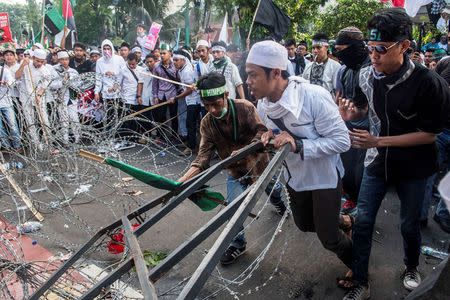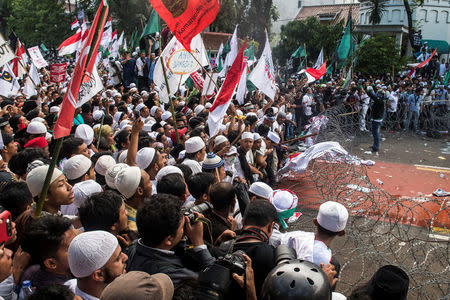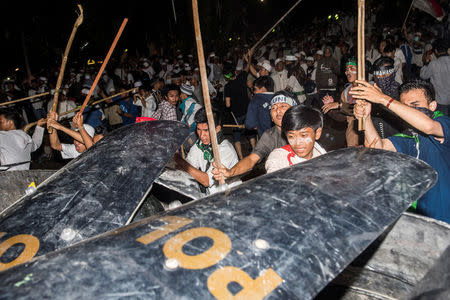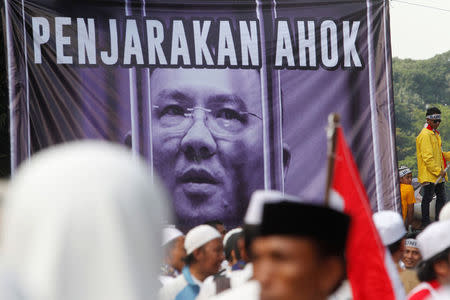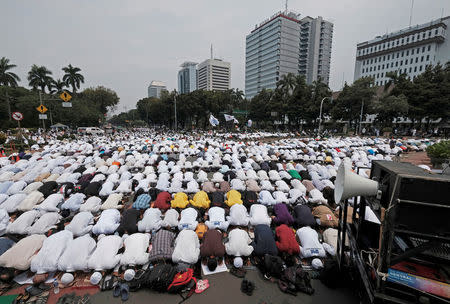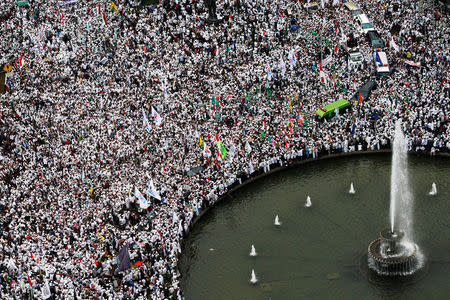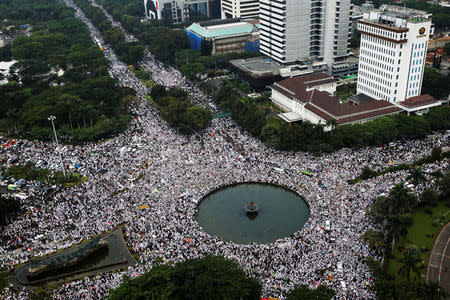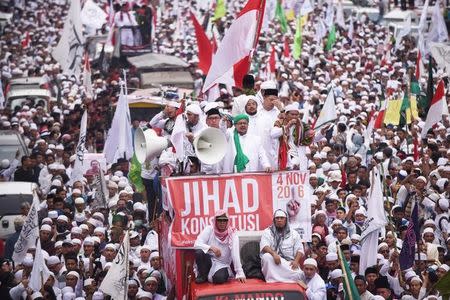Indonesian police quell mass protest by hardline Muslims
By Johan Purnomo and Fergus Jensen JAKARTA (Reuters) - Indonesian police quelled a mass protest by tens of thousands of hardline Muslims on Friday, firing tear gas and water cannon into crowds demanding the resignation of the Christian governor of Jakarta, who they said had insulted the Koran. A police spokesman said one person died and 12 were hurt. Indonesia is the world's most populous Muslim country, but most follow a moderate form of Islam and protests on such a large scale are rare. Critics say the protest was whipped up by an extremist group that latched on to political tension ahead of February's election for the governorship of Jakarta, the country's capital, and was allowed to grow because the government failed to rein it in. Police said the number of demonstrators in central Jakarta swelled to about 150,000 in the hours after Friday prayers as they congregated around the palace of President Joko Widodo. By late afternoon the crowd grew restive - some threw rocks at the police, two vehicles were torched and a fire broke out near the city's National Monument. Police responded with tear gas and water cannon and, by late evening, most protesters had left. However, hundreds said they would camp out overnight beside the parliament building, while in the north of the capital media reported a clash between police and a few dozen protesters and social media reports showed a convenience store being looted. "We see that political actors were taking advantage of the situation," President Widodo told reporters at an after-midnight news conference, referring to the violence, which he said took place after the demonstration should have dispersed. Many protesters were clad in robes and Muslim caps as they called for the resignation of Jakarta Governor Basuki Tjahja Purnama. A Christian and the first ethnic Chinese politician to lead the sprawling city of 10 million, Purnama is standing for re-election, competing with two Muslims for the job. Ethnic Chinese make up just over 1 percent of Indonesia's 250 million people, and they typically do not enter politics. Indonesian Chinese have faced persecution and violence in the past, especially during the political and social turmoil that gripped Jakarta when former strongman Suharto was toppled. More than a thousand were killed during the 1998 violence and many ethnic Chinese fled the country as mobs rampaged through Jakarta, looting and burning Chinese-owned shops and houses. "EXTREMISM, THUGGERY AND POLITICAL INTERESTS" The atmosphere in Jakarta was tense through Friday and some companies asked employees to work from home. Jakarta has some of the world's worst traffic jams at the best of times, but on Friday access to business districts was impossible for many. About a dozen Muslim groups have accused Purnama of blasphemy after he jokingly said his opponents had used a verse from the Koran to deceive voters. The verse implies that Muslims should not choose non-Muslims as leaders. "He is not Muslim but he humiliated the Koran," said one of Friday's protesters, Muhammad Said. "Don't refer to anything in the Koran, especially interpreting it incorrectly ... I call on God to jail him." Led by a group called the Islamic Defenders Front, the protesters chanted "God is greatest" and waved placards calling for Purnama, popularly known as Ahok, to be jailed for blasphemy. A white banner hung at an overpass was painted with red letters that read "Hang Ahok here". Police are investigating the case against Purnama, who has apologized for his remarks, insisting he was not criticizing the Koranic verse but those who used it to attack him. Purnama served as deputy to Widodo when the now-president was city governor from 2012 to 2014. He has a reputation as a no-nonsense reformer with little patience for the corruption widely blamed for the chaos of an overcrowded city, and remains popular despite the protests. Widodo, a Muslim, has vowed not to interfere in any legal proceedings against Purnama, according to media reports. But after government and security officials met representatives of the protesters on Friday, the president said that the legal process involving Purnama would be executed "swiftly, firmly and transparently". Critics say Widodo's government has not done enough to contain the religious and ethnic tension. As the protests raged in the heart of Jakarta on Friday, the president visited a rail construction project at the capital's airport, his office said. Security expert Sidney Jones said in an online commentary ahead of the protest that the movement brought together "violent extremists, moralist thugs and powerful political interests". "And because of the latter, no one dares challenge it. Indonesia's spineless political leaders have allowed extremists to seize the momentum and foment religious hatred," she said. There was talk that Islamist militants would use Friday's protest as cover to launch an attack in Jakarta. An attack in the capital early this year by supporters of Islamic State raised fears of a wave of violent militancy. (Reporting by Fergus Jensen and Johan Purnomo; Additional reporting by Gayatri Suroyo, Fransiska Nangoy, Eveline Danubrata, Angie Teo and Wilda Asmarini; Writing by Eveline Danubrata and John Chalmers; Editing by Alex Richardson)
